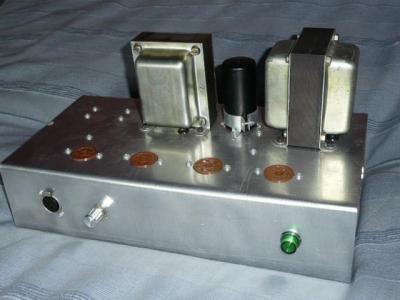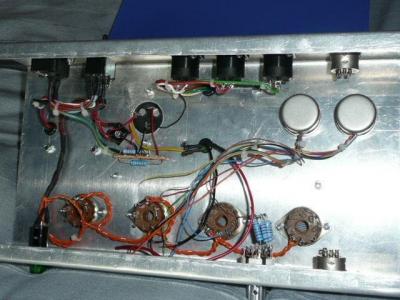@tv1010101
Thanks for starting attached 2 pics of my part made amp which a friend did for me a few years ago. Looking for someone with valve experience to assist with finishing. Ive only studied digital electronics at basic level. I have the circuit schematic diagram some where.
Some people call me a tool, others are less complimentary. Tools being useful things.
I've not built one *yet*, so I can't share any experience.
However, I'm starting with one of these
(which is quite technical)
and one of these
(which is a lot more hands-on practical)
I've put off building one for a while, because I'm also aware that there are bits that YOU MUST NOT TOUCH as the potential for shock is worse than sticking your fingers in a 240v socket ... so, whatever you do, go carefully!
Online guitar making courses – guitarmaking.co.uk
@tv1010101
Looks like a challenging project even with a kit which should have all the parts. Anything connected to the mains 240v has the potential for disaster. Valves work at about 400v usually I think, not sure if it's AC or DC, and a smaller current but it's enough to ruin your day.
If you are planning to take it to gigs it would have to be given a portable appliance test to check for earth leakage. This doesn't need to be a qualified electrician despite what some people will tell you, there is a short course to qualify and a test meter is used.
i can understand why you have been reluctant to start, I've had my project since 2007 and look for any excuse not to start. It was supposed to be for my electric fiddle but I don't play in a band these days so the reality I don't need it any more.
Some people call me a tool, others are less complimentary. Tools being useful things.
but it's enough to ruin your day
Indeed! @rocknroller912
Any idea whether your friend - who started the project for you - sourced the bits as a kit, or whether he went back to component level and bought those separately?
If a kit, and if the kit provider is still in business, perhaps they'd have some guidance notes.
Else, as Carol mentioned in the live chat, Barry Vyse runs amp-building courses so - in a post-Covid world - you might be able to book a day or two of his time to learn the basics before getting the soldering iron out.
Online guitar making courses – guitarmaking.co.uk
Online guitar making courses – guitarmaking.co.uk
@tv1010101
My friend bought all the individual components for the amp and designed the circuit himself. The base is flat aluminium folded on a machine. He does have a degree in instrumentation so it probably wasn't too hard for him being a boffin scientist. He did offer to come up to my place and finish it but the trade off is I've got to help help him build a traditional kayak in my front drive.
Some people call me a tool, others are less complimentary. Tools being useful things.
Online guitar making courses – guitarmaking.co.uk
My friend bought all the individual components for the amp and designed the circuit himself.
Hmmmmm ... you might struggle to find someone to finish that for you! Unless it's a minor variation on a standard circuit.
But, tbh, for the cost of kits, you might be better starting from scratch and understanding what you're doing?
Online guitar making courses – guitarmaking.co.uk
@tv1010101
The circuit diagram for the connections isn't that hard but my friend suggested putting the resistors/capacitors into a printed circuit board which can be tricky to design and make. Another friend who is qualified in electronics says this is wrong and valve amps always have the components hard wired to a tag strip, so my dilemma is two experts with different opinions and I'm not sure which is correct. Also I have to source the valves which are not the same as a tube amp. Will will probably get there one day.
Some people call me a tool, others are less complimentary. Tools being useful things.
@tv1010101
Ive just checked the link you posted for Vyse Amps and see that their photos are all hard wired components not pcbs so I think this points me in the direction I need to go. Thanks very much.
Some people call me a tool, others are less complimentary. Tools being useful things.
Really interested to see how this works out @rocknroller912.
Printed circuit boards are great if you're making hundreds/thousands of the thing, and then all you need to worry about is putting the components in the right places.
The amp building course I was going to go on (just before Covid arrived) would have been all hand-wired.
Take a look at this ...
Online guitar making courses – guitarmaking.co.uk
@rocknroller912 Two experts with different opinions? No! You’re shitting me!! You want to try dealing with hifi speaker designers. I must have dealt with more than 20 in the last couple of decades and they all had completely different ideas, they were always 100% right, were going to revolutionise the world and the rest of the industry didn’t have a clue what they were doing!! Have I heard of any of them since? Non!
It’s not that difficult to make your own circuit boards, or at least it wasn’t before the demise of Maplins, but you can knock up pretty good prototypes and development circuits using strip board or ‘Vero board’ as I knew it as a kid. RS Components are a great source fo this kind of thing. The fun I’ve had going though the RS catalogue over the years! Resolution for 2021 - Must remember to get a life!!!
I take your point about experts completely, think that's how people become experts by debating everything to infinity. After watching the video posted by @tv1010101 I now have more understanding of the way valve amps are put together, as some components are on a circuit board but not the same as a digital pcb.
I have designed and made pcbs before when I did my electronics exam in 1993 but foolishly had a clear out a few years ago and threw all the stuff away thinking I would never need it again and wanted to make more room for wood storage. I even threw out the digital amp that I built for the exam which had active bass/treble controls built into a feedback loop.
Some people call me a tool, others are less complimentary. Tools being useful things.
@tv1010101
I watched the video link that you posted, the instructor really knows his stuff. It's a course I would like to do also. Looking at the photo of the kit which you are intending to build, do the capacitors have + and - marks on them.
Some people call me a tool, others are less complimentary. Tools being useful things.
I watched the video link that you posted, the instructor really knows his stuff. It's a course I would like to do also.
I’ve known Chris (Rift Amps) for a few years. His amps are pretty well regarded. I finally decided to do his course - it would have been the weekend before lockdown - but Chris had to cancel. And he’s not running them again for the foreseeable.
🙁
Hence me thinking about doing a self-build kit instead ... I can follow a diagram, and solder. I just won’t *understand* all the details of why I’m soldering this bit to that bit to the other bit!
Online guitar making courses – guitarmaking.co.uk
I built a valve amp 4 or 5 years ago - try a search on AX84 - there is a community based around a single ended 5 Watt amp with an EL84 power valve.
There was enough detail for a novice to build an amp - it is worth a look even if you didn’t end up building this amp.
The AX84 has volume and gain and bass, middle and treble tone stack.
I was going to build a Princeton Reverb clone - bought chassis, front panel and a set of transformers and then realised that it would have been too loud to get dirty at a useable home volume......
The bits of Princeton were sold and I have plans to build a real amp at some stage, probably later next year...
Measure once........ Measure again......... Sod it - make tea!
@tv1010101
My knowledge of valve amps is limited but I do know they have a heater and a bias voltage which makes current flow. Large value capacitors are used to store energy and act as a buffer (I think) between different parts. Mains voltage has to be stepped up to the the level needed to make the valve work using resistors to increase the voltage difference between two points. The basic theory is not too hard to understand but the dangers of getting the design wrong or making are poor construction are big, so I've never wanted to play around without getting some training. I didn't know about kits but think it's something I will look at.
Some people call me a tool, others are less complimentary. Tools being useful things.







